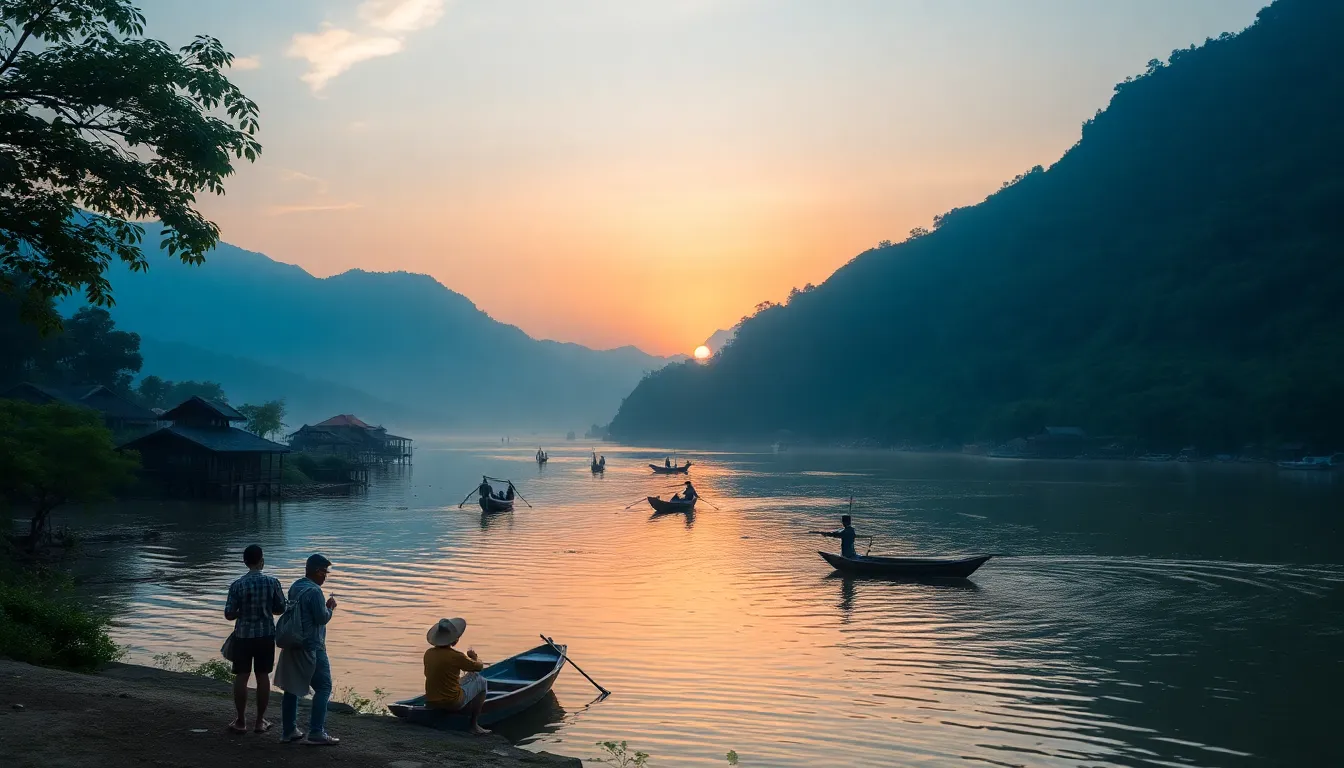Lake Yiganlawi, a shimmering gem nestled in nature’s embrace, has long been a subject of intrigue. With its serene waters and picturesque surroundings, it’s hard to imagine this stunning lake ever facing the dreaded drought. But hold onto your fishing poles! What if this beloved body of water has had its dry spells?
Has Lake Yiganlawi Ever Dried Up
Lake Yiganlawi, located in a serene landscape, boasts a rich ecological environment. This body of water serves as a habitat for various wildlife species, contributing to the local biodiversity. Fishermen often utilize the lake for its abundant fish populations, highlighting its importance to the community.
Hydrological studies indicate that Lake Yiganlawi relies on seasonal rainfall and surrounding tributaries for its water supply. Understanding this relationship reveals how changes in climate patterns can impact the lake’s water levels. Some local accounts suggest that the lake may have experienced lower water levels during particularly dry seasons, indicating possible drought events.
Researchers have documented fluctuations in lake size over the years, attributing them to both natural and human factors. Seasonal variations affect the water level, and prolonged dry spells can lead to significant reductions in lake volume. Community members often share stories of past droughts, reflecting a historical perspective on the lake’s resilience.
Government agencies closely monitor water resources in the region, ensuring sustainable management practices. Regular assessments help track changes and implement conservation measures if necessary. Local initiatives aim to raise awareness about the significance of protecting Lake Yiganlawi’s ecosystem against threats that could lead to further drying.
Understanding these dynamics clarifies why ongoing observations of Lake Yiganlawi are crucial. Environmental conditions can alter its characteristics, making it essential for residents to stay informed about the lake’s status.
Historical Significance

Lake Yiganlawi holds a prominent place in the region’s history, reflecting its ecological and cultural heritage.
Cultural Importance
Community members regard Lake Yiganlawi as a vital cultural landmark. Traditional rituals and festivals often take place near the lake, fostering a strong connection between locals and nature. Folklore surrounding the lake enriches cultural narratives, passed down through generations. Storytelling about the lake’s beauty and significance preserves local traditions and strengthens community bonds. Visitors frequently find the lake’s serene environment a fitting backdrop for cultural gatherings, enhancing its role in the community’s social fabric.
Economic Impact
The economic implications of Lake Yiganlawi are significant for the local population. Fishermen depend on the lake’s bountiful fish populations for their livelihoods, contributing to the area’s economy. Tourist activities, including fishing and eco-tourism, generate revenue and provide job opportunities. Local businesses often thrive due to the influx of visitors drawn to the lake’s scenic beauty. Seasonal fluctuations in water levels can, however, influence fishing yields, prompting an ongoing dialogue about sustainable practices to maintain economic stability.
Evidence of Drying Up
Lake Yiganlawi has faced varying water levels throughout its history, underscoring its vulnerability to environmental changes. Several documented studies highlight these fluctuations, showcasing evidence of drying up.
Ecological Studies
Researchers focused on Lake Yiganlawi have collected extensive data regarding its water levels. Studies indicate significant correlations between seasonal rainfall and lake size, revealing that reduced precipitation periods often lead to decreased water levels. Various aquatic species, including fish populations, respond dramatically to these changes, affecting local biodiversity. These ecological insights underscore the lake’s dependency on its surrounding environment. Monitoring programs further document how human activities, such as land use changes, impact the lake’s hydrology. Regular assessments by environmental agencies aim to protect this critical ecosystem and provide updates on potential drought conditions.
Historical Records
Historical documents reveal that Lake Yiganlawi has experienced notable dry spells in the past. Local residents recall stories dating back several decades of reduced water levels during particularly arid seasons. These accounts, passed down through generations, reflect the historical significance of the lake as a resource for the community. Records maintained by local authorities trace fluctuations in lake size, indicating that drought events occurred intermittently. Furthermore, anthropological studies highlight how these fluctuations affected fishing yields and community livelihoods, emphasizing the importance of sustainable practices. Insights from historical accounts complement ongoing observations, providing a comprehensive understanding of the lake’s changing dynamics.
Current Status of Lake Yiganlawi
Lake Yiganlawi experiences notable fluctuations in water levels, influenced by various environmental factors.
Seasonal Variations
Fluctuations occur in accordance with seasonal rainfall patterns. During wet seasons, lake levels typically rise, fostering a thriving ecological environment. However, dry seasons often result in lower water levels, impacting aquatic life and fishing communities. Community members observe a direct link between seasonal changes and fish populations, with decreased water levels hindering fishing yields. Historical accounts reflect similar trends, reinforcing the lake’s vulnerability to seasonal variations.
Recent Climatic Changes
Changes in climate patterns increasingly affect Lake Yiganlawi’s water levels. Warm temperatures and reduced precipitation have contributed to noticeable declines in lake size. Researchers document significant correlations between decreased rainfall and lower water levels, impacting local biodiversity. Community stakeholders express concern about these trends, as they threaten both the ecosystem and local livelihoods. Monitoring efforts by government agencies aim to address these challenges and promote sustainable management practices.
Future Prospects
Research indicates that Lake Yiganlawi’s future heavily relies on consistent rainfall patterns. Climatic shifts may lead to unpredictable weather, affecting the lake’s water supply. Increased temperatures can exacerbate evaporation rates, further threatening water levels. Seasonal rainfall, while essential for replenishment, may become less reliable due to climate change.
Environmental studies provide insight into potential challenges. Historical data showcases fluctuations, suggesting oscillating drought conditions could reoccur. Local communities heavily impacted by fishing activities face potential declines in yield during dry spells. Ecological balance hinges on maintaining adequate water levels, critical for sustaining fish populations.
Monitoring initiatives play a vital role in assessing water quality and levels. Government agencies actively track changes, facilitating timely interventions as necessary. Effective management strategies could mitigate adverse effects on local biodiversity and fishing economies. Community engagement remains crucial in promoting awareness and fostering resilience against environmental changes.
Adaptive practices must become a priority. Implementing sustainable fishing techniques can support both fisheries and the lake’s health. Conservation efforts might focus on reducing water waste and protecting surrounding habitats. These actions have the potential to strengthen the lake’s ecosystem and ensure its availability for future generations.
Collaborative efforts between local stakeholders and environmental organizations show promise. Such partnerships could enhance resource management and ecological preservation. By engaging in proactive measures, Lake Yiganlawi can continue to serve as a vital resource for the community and ecosystem alike.
Lake Yiganlawi’s history reveals its resilience amid environmental challenges. The lake’s ability to adapt to seasonal fluctuations showcases its vital role in supporting local biodiversity and community livelihoods. As climate patterns continue to shift, ongoing monitoring and sustainable practices become essential for its preservation.
The lake’s cultural and economic significance underscores the need for collective efforts to protect this precious resource. By fostering awareness and implementing adaptive strategies, the community can ensure that Lake Yiganlawi remains a thriving ecosystem for generations to come.









